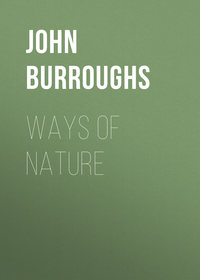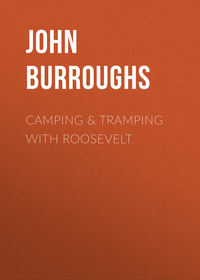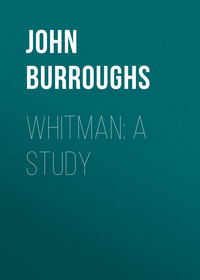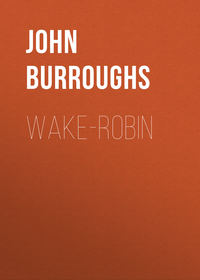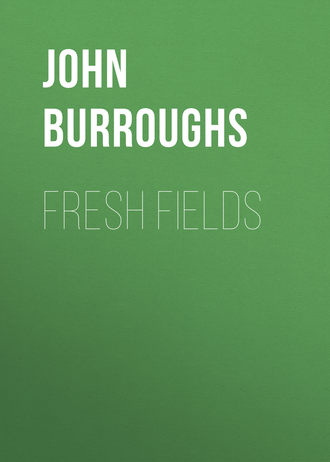 полная версия
полная версияFresh Fields
If all the people of whom I inquired for nightingales in England could have been together and compared notes, they probably would not have been long in deciding that there was at least one crazy American abroad.
I proposed to be up and off at five o'clock in the morning, which seemed greatly to puzzle mine host. At first he thought it could not be done, but finally saw his way out of the dilemma, and said he would get up and undo the door for me himself. The morning was cloudy and misty, though the previous night had been of the fairest. There is one thing they do not have in England that we can boast of at home, and that is a good masculine type of weather: it is not even feminine; it is childish and puerile, though I am told that occasionally there is a full-grown storm. But I saw nothing but petulant little showers and prolonged juvenile sulks. The clouds have no reserve, no dignity; if there is a drop of water in them (and there generally are several drops), out it comes. The prettiest little showers march across the country in summer, scarcely bigger than a street watering-cart; sometimes by getting over the fence one can avoid them, but they keep the haymakers in a perpetual flurry. There is no cloud scenery, as with us, no mass and solidity, no height nor depth. The clouds seem low, vague, and vapory, – immature, indefinite, inconsequential, like youth.
The walk to Selborne was through mist and light rain. Few bird voices, save the cries of the lapwing and the curlew, were heard. Shortly after leaving Liphook the road takes a straight cut for three or four miles through a level, black, barren, peaty stretch of country, with Wolmer Forest a short distance on the right. Under the low-hanging clouds the scene was a dismal one, – a black earth beneath and a gloomy sky above. For miles the only sign of life was a baker's cart rattling along the smooth, white road. At the end of this solitude I came to cultivated fields, and a little hamlet and an inn. At this inn (for a wonder!) I got some breakfast. The family had not yet had theirs, and I sat with them at the table, and had substantial fare. From this point I followed a footpath a couple of miles through fields and parks. The highways for the most part seemed so narrow and exclusive, or inclusive, such penalties seemed to attach to a view over the high walls and hedges that shut me in, that a footpath was always a welcome escape to me. I opened the wicket or mounted the stile without much concern as to whether it would further me on my way or not. It was like turning the flank of an enemy. These well-kept fields and lawns, these cozy nooks, these stately and exclusive houses that had taken such pains to shut out the public gaze, – from the footpath one had them at an advantage, and could pluck out their mystery. On striking the highway again, I met the postmistress, stepping briskly along with the morning mail. Her husband had died, and she had taken his place as mail-carrier. England is so densely populated, the country is so like a great city suburb, that your mail is brought to your door everywhere, the same as in town. I walked a distance with a boy driving a little old white horse with a cart-load of brick. He lived at Hedleigh, six miles distant; he had left there at five o'clock in the morning, and had heard a nightingale. He was sure; as I pressed him, he described the place minutely. "She was in the large fir-tree by Tom Anthony's gate, at the south end of the village." Then, I said, doubtless I shall find one in some of Gilbert White's haunts; but I did not. I spent two rainy days at Selborne; I passed many chilly and cheerless hours loitering along those wet lanes and dells and dripping hangers, wooing both my bird and the spirit of the gentle parson, but apparently without getting very near to either. When I think of the place now, I see its hurrying and anxious haymakers in the field of mown grass, and hear the cry of a child that sat in the hay back of the old church, and cried by the hour while its mother was busy with her rake not far off. The rain had ceased, the hay had dried off a little, and scores of men, women, and children, but mostly women, had flocked to the fields to rake it up. The hay is got together inch by inch, and every inch is fought for. They first rake it up into narrow swaths, each person taking a strip about a yard wide. If they hold the ground thus gained, when the hay dries an hour or two longer, they take another hitch, and thus on till they get it into the cock or "carry" it from the windrow. It is usually nearly worn out with handling before they get it into the rick.
From Selborne I went to Alton, along a road that was one prolonged rifle-pit, but smooth and hard as a rock; thence by train back to London. To leave no ground for self-accusation in future, on the score of not having made a thorough effort to hear my songster, I the next day made a trip north toward Cambridge, leaving the train at Hitchin, a large picturesque old town, and thought myself in just the right place at last. I found a road between the station and the town proper called Nightingale Lane, famous for its songsters. A man who kept a thrifty-looking inn on the corner (where, by the way, I was again refused both bed and board) said they sang night and morning in the trees opposite. He had heard them the night before, but had not noticed them that morning. He often sat at night with his friends, with open windows, listening to the strain. He said he had tried several times to hold his breath as long as the bird did in uttering certain notes, but could not do it. This, I knew, was an exaggeration; but I waited eagerly for nightfall, and, when it came, paced the street like a patrolman, and paced other streets, and lingered about other likely localities, but caught nothing but neuralgic pains in my shoulder. I had no better success in the morning, and here gave over the pursuit, saying to myself, It matters little, after all; I have seen the country and had some object for a walk, and that is sufficient.
Altogether I heard the bird less than five minutes, and only a few bars of its song, but enough to satisfy me of the surprising quality of the strain.
It had the master tone as clearly as Tennyson or any great prima donna or famous orator has it. Indeed, it was just the same. Here is the complete artist, of whom all these other birds are but hints and studies. Bright, startling, assured, of great compass and power, it easily dominates all other notes; the harsher chur-r-r-r-rg notes serve as foil to her surpassing brilliancy. Wordsworth, among the poets, has hit off the song nearest: —
"Those notes of thine, – they pierce and pierce;Tumultuous harmony and fierce!"I could easily understand that this bird might keep people awake at night by singing near their houses, as I was assured it frequently does; there is something in the strain so startling and awakening. Its start is a vivid flash of sound. On the whole, a high-bred, courtly, chivalrous song; a song for ladies to hear leaning from embowered windows on moonlight nights; a song for royal parks and groves, – and easeful but impassioned life. We have no bird-voice so piercing and loud, with such flexibility and compass, such full-throated harmony and long-drawn cadences; though we have songs of more melody, tenderness, and plaintiveness. None but the nightingale could have inspired Keats's ode, – that longing for self-forgetfulness and for the oblivion of the world, to escape the fret and fever of life.
"And with thee fade away into the forest dim."
V
ENGLISH AND AMERICAN SONG-BIRDS
The charm of the songs of birds, like that of a nation's popular airs and hymns, is so little a question of intrinsic musical excellence, and so largely a matter of association and suggestion, or of subjective coloring and reminiscence, that it is perhaps entirely natural for every people to think their own feathered songsters the best. What music would there not be to the homesick American, in Europe, in the simple and plaintive note of our bluebird, or the ditty of our song sparrow, or the honest carol of our robin; and what, to the European traveler in this country, in the burst of the blackcap, or the redbreast, or the whistle of the merlin! The relative merit of bird-songs can hardly be settled dogmatically; I suspect there is very little of what we call music, or of what could be noted on the musical scale, in even the best of them; they are parts of nature, and their power is in the degree in which they speak to our experience.
When the Duke of Argyll, who is a lover of the birds and a good ornithologist, was in this country, he got the impression that our song-birds were inferior to the British, and he refers to others of his countrymen as of like opinion. No wonder he thought our robin inferior in power to the missel thrush, in variety to the mavis, and in melody to the blackbird! Robin did not and could not sing to his ears the song he sings to ours. Then it is very likely true that his grace did not hear the robin in the most opportune moment and season, or when the contrast of his song with the general silence and desolation of nature is the most striking and impressive. The nightingale needs to be heard at night, the lark at dawn rising to meet the sun; and robin, if you would know the magic of his voice, should be heard in early spring, when, as the sun is setting, he carols steadily for ten or fifteen minutes from the top of some near tree. There is perhaps no other sound in nature; patches of snow linger here and there; the trees are naked and the earth is cold and dead, and this contented, hopeful, reassuring, and withal musical strain, poured out so freely and deliberately, fills the void with the very breath and presence of the spring. It is a simple strain, well suited to the early season; there are no intricacies in it, but its honest cheer and directness, with its slight plaintive tinge, like that of the sun gilding the treetops, go straight to the heart. The compass and variety of the robin's powers are not to be despised either. A German who has great skill in the musical education of birds told me what I was surprised to hear, namely, that our robin surpasses the European blackbird in capabilities of voice.
The duke does not mention by name all the birds he heard while in this country. He was evidently influenced in his opinion of them by the fact that our common sandpiper appeared to be a silent bird, whereas its British cousin, the sandpiper of the lakes and streams of the Scottish Highlands, is very loquacious, and the "male bird has a continuous and most lively song." Either the duke must have seen our bird in one of its silent and meditative moods, or else, in the wilds of Canada where his grace speaks of having seen it, the sandpiper is a more taciturn bird than it is in the States. True, its call-notes are not incessant, and it is not properly a song-bird any more than the British species is; but it has a very pretty and pleasing note as it flits up and down our summer streams, or runs along on their gray, pebbly, and bowlder-strewn shallows. I often hear its calling and piping at night during its spring migratings. Indeed, we have no silent bird that I am aware of, though our pretty cedar-bird has, perhaps, the least voice of any. A lady writes me that she has heard the hummingbird sing, and says she is not to be put down, even if I were to prove by the anatomy of the bird's vocal organs that a song was impossible to it.
Argyll says that, though he was in the woods and fields of Canada and of the States in the richest moment of the spring, he heard little of that burst of song which in England comes from the blackcap, and the garden warbler, and the whitethroat, and the reed warbler, and the common wren, and (locally) from the nightingale. There is no lack of a burst of song in this country (except in the remote forest solitudes) during the richest moment of the spring, say from the 1st to the 20th of May, and at times till near midsummer; moreover, more bird-voices join in it, as I shall point out, than in Britain; but it is probably more fitful and intermittent, more confined to certain hours of the day, and probably proceeds from throats less loud and vivacious than that with which our distinguished critic was familiar. The ear hears best and easiest what it has heard before. Properly to apprehend and appreciate bird-songs, especially to disentangle them from the confused murmur of nature, requires more or less familiarity with them. If the duke had passed a season with us in some one place in the country, in New York or New England, he would probably have modified his views about the silence of our birds.
One season, early in May, I discovered an English skylark in full song above a broad, low meadow in the midst of a landscape that possessed features attractive to a great variety of our birds. Every morning for many days I used to go and sit on the brow of a low hill that commanded the field, or else upon a gentle swell in the midst of the meadow itself, and listen to catch the song of the lark. The maze and tangle of bird-voices and bird-choruses through which my ear groped its way searching for the new song can be imagined when I say that within hearing there were from fifteen to twenty different kinds of songsters, all more or less in full tune. If their notes and calls could have been materialized and made as palpable to the eye as they were to the ear, I think they would have veiled the landscape and darkened the day. There were big songs and little songs, – songs from the trees, the bushes, the ground, the air, – warbles, trills, chants, musical calls, and squeals, etc. Near by in the foreground were the catbird and the brown thrasher, the former in the bushes, the latter on the top of a hickory. These birds are related to the mockingbird, and may be called performers; their songs are a series of vocal feats, like the exhibition of an acrobat; they throw musical somersaults, and turn and twist and contort themselves in a very edifying manner, with now and then a ventriloquial touch. The catbird is the more shrill, supple, and feminine; the thrasher the louder, richer, and more audacious. The mate of the latter had a nest, which I found in a field under the spreading ground-juniper. From several points along the course of a bushy little creek there came a song, or a melody of notes and calls, that also put me out, – the tipsy, hodge-podge strain of the polyglot chat, a strong, olive-backed, yellow-breasted, black-billed bird, with a voice like that of a jay or a crow that had been to school to a robin or an oriole, – a performer sure to arrest your ear and sure to elude your eye. There is no bird so afraid of being seen, or fonder of being heard.
The golden voice of the wood thrush that came to me from the border of the woods on my right was no hindrance to the ear, it was so serene, liquid, and, as it were, transparent: the lark's song has nothing in common with it. Neither were the songs of the many bobolinks in the meadow at all confusing, – a brief tinkle of silver bells in the grass, while I was listening for a sound more like the sharp and continuous hum of silver wheels upon a pebbly beach. Certain notes of the red-shouldered starlings in the alders and swamp maples near by, the distant barbaric voice of the great crested flycatcher, the jingle of the kingbird, the shrill, metallic song of the savanna sparrow, and the piercing call of the meadowlark, all stood more or less in the way of the strain I was listening for, because every one had a touch of that burr or guttural hum of the lark's song. The ear had still other notes to contend with, as the strong, bright warble of the tanager, the richer and more melodious strain of the rose-breasted grosbeak, the distant, brief, and emphatic song of the chewink, the child-like contented warble of the red-eyed vireo, the animated strain of the goldfinch, the softly ringing notes of the bush sparrow, the rapid, circling, vivacious strain of the purple finch, the gentle lullaby of the song sparrow, the pleasing "wichery," "wichery" of the yellow-throat, the clear whistle of the oriole, the loud call of the high-hole, the squeak and chatter of swallows, etc. But when the lark did rise in full song, it was easy to hear him athwart all these various sounds, first, because of the sense of altitude his strain had, – its skyward character, – and then because of its loud, aspirated, penetrating, unceasing, jubilant quality. It cut its way to the ear like something exceeding swift, sharp, and copious. It overtook and outran every other sound; it had an undertone like the humming of multitudinous wheels and spindles. Now and then some turn would start and set off a new combination of shriller or of graver notes, but all of the same precipitate, out-rushing and down-pouring character; not, on the whole, a sweet or melodious song, but a strong and blithe one.
The duke is abundantly justified in saying that we have no bird in this country, at least east of the Mississippi, that can fill the place of the skylark. Our high, wide, bright skies seem his proper field, too. His song is a pure ecstasy, untouched by any plaintiveness, or pride, or mere hilarity, – a well-spring of morning joy and blitheness set high above the fields and downs. Its effect is well suggested in this stanza of Wordsworth: —
"Up with me! up with me into the clouds!For thy song, Lark, is strong;Up with me, up with me into the clouds!Singing, singing,With clouds and sky about thee ringing,Lift me, guide me till I findThat spot which seems so to thy mind!"But judging from Gilbert White's and Barrington's lists, I should say that our bird-choir was a larger one, and embraced more good songsters, than the British.
White names twenty-two species of birds that sing in England during the spring and summer, including the swallow in the list. A list of the spring and summer songsters in New York and New England, without naming any that are characteristically wood-birds, like the hermit thrush and veery, the two wagtails, the thirty or more warblers, and the solitary vireo, or including any of the birds that have musical call-notes, and by some are denominated songsters, as the bluebird, the sandpiper, the swallow, the red-shouldered starling, the pewee, the high-hole, and others, would embrace more names, though perhaps no songsters equal to the lark and nightingale, to wit: the robin, the catbird, the Baltimore oriole, the orchard oriole, the song sparrow, the wood sparrow, the vesper sparrow, the social sparrow, the swamp sparrow, the purple finch, the wood thrush, the scarlet tanager, the indigo-bird, the goldfinch, the bobolink, the summer yellowbird, the meadowlark, the house wren, the marsh wren, the brown thrasher, the chewink, the chat, the red-eyed vireo, the white-eyed vireo, the Maryland yellow-throat, and the rose-breasted grosbeak.
The British sparrows are for the most part songless. What a ditty is that of our song sparrow, rising from the garden fence or the roadside so early in March, so prophetic and touching, with endless variations and pretty trilling effects; or the song of the vesper sparrow, full of the repose and the wild sweetness of the fields; or the strain of the little bush sparrow, suddenly projected upon the silence of the fields or of the evening twilight, and delighting the ear as a beautiful scroll delights the eye! The white-crowned, the white-throated, and the Canada sparrows sing transiently spring and fall; and I have heard the fox sparrow in April, when his song haunted my heart like some bright, sad, delicious memory of youth, – the richest and most moving of all sparrow-songs.
Our wren-music, too, is superior to anything of the kind in the Old World, because we have a greater variety of wren-songsters. Our house wren is inferior to the British house wren, but our marsh wren has a lively song; while our winter wren, in sprightliness, mellowness, plaintiveness, and execution, is surpassed by but few songsters in the world. The summer haunts of this wren are our high, cool, northern woods, where, for the most part, his music is lost on the primeval solitude.
The British flycatcher, according to White, is a silent bird, while our species, as the phœbe-bird, the wood pewee, the kingbird, the little green flycatcher, and others, all have notes more or less lively and musical. The great crested flycatcher has a harsh voice, but the pathetic and silvery note of the wood pewee more than makes up for it. White says the golden-crowned wren is not a song-bird in Great Britain. The corresponding species here has a pleasing though not remarkable song, which is seldom heard, however, except in its breeding haunts in the north. But its congener, the ruby-crowned kinglet, has a rich, delicious, and prolonged warble, which is noticeable in the Northern States for a week or two in April or May, while the bird pauses to feed on its way to its summer home.
There are no vireos in Europe, nor birds that answer to them. With us, they contribute an important element to the music of our groves and woods. There are few birds I should miss more than the red-eyed vireo, with his cheerful musical soliloquy, all day and all summer, in the maples and locusts. It is he, or rather she, that builds the exquisite basket nest on the ends of the low, leafy branches, suspending it between two twigs. The warbling vireo has a stronger, louder strain, more continuous, but not quite so sweet. The solitary vireo is heard only in the deep woods, while the white-eyed is still more local or restricted in its range, being found only in wet, bushy places, whence its vehement, varied, and brilliant song is sure to catch the dullest ear.
The goldfinches of the two countries, though differing in plumage, are perhaps pretty evenly matched in song; while our purple finch, or linnet, I am persuaded, ranks far above the English linnet, or lintie, as the Scotch call it. In compass, in melody, in sprightliness, it is a remarkable songster. Indeed, take the finches as a family, they certainly furnish more good songsters in this country than in Great Britain. They furnish the staple of our bird-melody, including in the family the tanager and the grosbeaks, while in Europe the warblers lead. White names seven finches in his list, and Barrington includes eight, none of them very noted songsters, except the linnet. Our list would include the sparrows above named, and the indigo-bird, the goldfinch, the purple finch, the scarlet tanager, the rose-breasted grosbeak, the blue grosbeak, and the cardinal bird. Of these birds, all except the fox sparrow and the blue grosbeak are familiar summer songsters throughout the Middle and Eastern States. The indigo-bird is a midsummer and an all-summer songster of great brilliancy. So is the tanager. I judge there is no European thrush that, in the pure charm of melody and hymn-like serenity and spirituality, equals our wood and hermit thrushes, as there is no bird there that, in simple lingual excellence, approaches our bobolink.
The European cuckoo makes more music than ours, and their robin redbreast is a better singer than the allied species, to wit, the bluebird, with us. But it is mainly in the larks and warblers that the European birds are richer in songsters than are ours. We have an army of small wood-warblers, – no less than forty species, – but most of them have faint chattering or lisping songs that escape all but the most attentive ear, and then they spend the summer far to the north. Our two wagtails are our most brilliant warblers, if we except the kinglets, which are Northern birds in summer, and the Kentucky warbler, which is a Southern bird; but they probably do not match the English blackcap, or whitethroat, or garden warbler, to say nothing of the nightingale, though Audubon thought our large-billed water-thrush, or wagtail, equaled that famous bird. It is certainly a brilliant songster, but most provokingly brief; the ear is arrested by a sudden joyous burst of melody proceeding from the dim aisles along which some wild brook has its way, but just as you say "Listen!" it ceases. I hear and see the bird every season along a rocky stream that flows through a deep chasm amid a wood of hemlock and pine. As I sit at the foot of some cascade, or on the brink of some little dark eddying pool above it, this bird darts by me, up or down the stream, or alights near me, upon a rock or stone at the edge of the water. Its speckled breast, its dark olive-colored back, its teetering, mincing gait, like that of a sandpiper, and its sharp chit, like the click of two pebbles under water, are characteristic features. Then its quick, ringing song, which you are sure presently to hear, suggests something so bright and silvery that it seems almost to light up, for a brief moment, the dim retreat. If this strain were only sustained and prolonged like the nightingale's, there would be good grounds for Audubon's comparison. Its cousin, the wood wagtail, or golden-crowned thrush of the older ornithologists, and golden-crowned accentor of the later, – a common bird in all our woods, – has a similar strain, which it delivers as it were surreptitiously, and in the most precipitate manner, while on the wing, high above the treetops. It is a kind of wood-lark, practicing and rehearsing on the sly. When the modest songster is ready to come out and give all a chance to hear his full and completed strain, the European wood-lark will need to look to his laurels. These two birds are our best warblers, and yet they are probably seldom heard, except by persons who know and admire them. If the two kinglets could also be included in our common New England summer residents, our warbler music would only pale before the song of Philomela herself. The English redstart evidently surpasses ours as a songster, and we have no bird to match the English wood-lark above referred to, which is said to be but little inferior to the skylark; but, on the other hand, besides the sparrows and vireos, already mentioned, they have no songsters to match our oriole, our orchard starling, our catbird, our brown thrasher (second only to the mockingbird), our chewink, our snowbird, our cow-bunting, our bobolink, and our yellow-breasted chat. As regards the swallows of the two countries, the advantage is rather on the side of the American. Our chimney swallow, with his incessant, silvery, rattling chipper, evidently makes more music than the corresponding house swallow of Europe; while our purple martin is not represented in the Old World avifauna at all. And yet it is probably true that a dweller in England hears more bird-music throughout the year than a dweller in this country, and that which, in some respects, is of a superior order.


